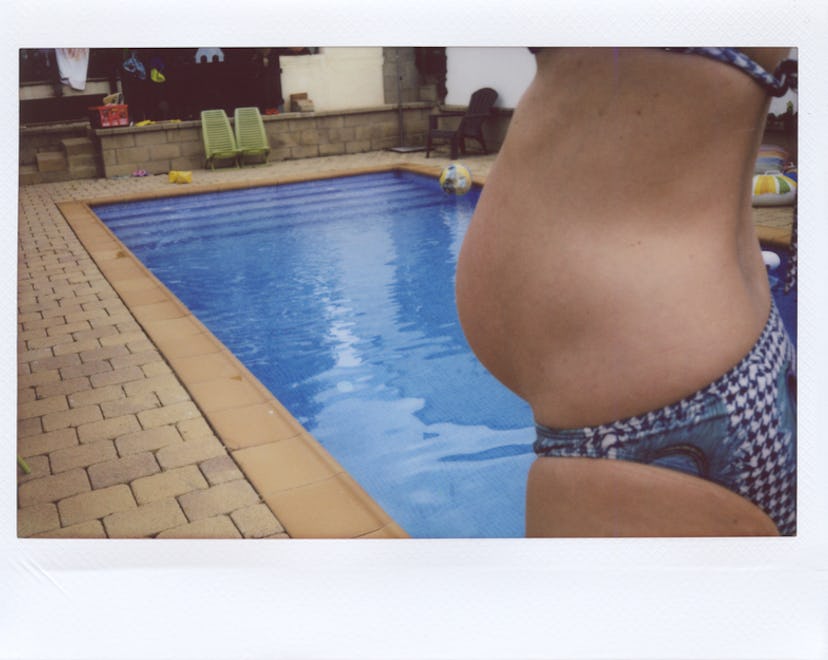Summer

Pool Cannonballs Are Pretty Much A No-Go During Pregnancy
But floating and swimming and letting the water carry your belly for you? Totally OK.
Hard cheeses and charcuterie. Adult beverages. Sushi. Pregnancy is a special experience, but it’s not without sacrifice. And when it comes to summer fun, moms-to-be may want to be cautious when considering activities in which to take part. One exercise that might get the green light is swimming while pregnant. “Swimming offers a good bang for your buck in terms of achieving a whole-body workout,” Cybill Esguerra, M.D., assistant professor of gynecology and Obstetrics, Johns Hopkins Medicine, tells Romper. “Furthermore, the water supports one’s body weight in a way that reduces strain on joints, so it can be particularly beneficial for women with joint pain, or as one component in a cross-training regimen.”
And while swimming can be a therapeutic activity that goes easy on your muscles, shares The American College of Obstetricians and Gynecologists (ACOG), you should think twice about jumping in the pool while pregnant. Before diving into the fun, take a second to absorb some facts about staying safe. Splashing? Totally fine. Running around the pool? Nope. Watching your friend’s kid do a cannonball into the deep end? So funny. Jumping in yourself? Best take the stairs. Here, experts share more advice to help you tread these waters.
Stay Safe When Swimming & Hitting The Pool
If you’re considering a pool day, remember the area outside the water poses some potential risks. OB-GYN Tiffany Pham tells Romper in an interview that she cautions her patients to be extra careful around the pool while they’re expecting.
“During swimming activities, it is recommended that pregnant women take extra precautions in order to avoid slipping or falling around the swimming area,” says Pham, who recommends wearing water shoes around the pool to help prevent such accidents. (Check out comfortable, colorful options here.)
Also be mindful of how hot or cold the water is, says Esguerra. “Pregnant women should avoid swimming in bodies of water at extremes of temperature and should follow the same guidelines and common sense practices when it comes to avoiding water-borne pathogens.” The Centers For Disease Control and Prevention (CDC) shares insight into sickness that can come from splashing around, and tips on how to stay healthy.
Slide On Into The Shallow End
Pregnancy is not the time to make a splashy entrance: “Jumping or diving into the pool should also be avoided,” Pham says. Apparently these moves can have too much of an impact, and can cause issues with your placenta.
“During pregnancy, trauma to the abdomen can result in a condition called placental abruption, which can have deadly consequences,” says Pham. “The placenta itself is attached to the wall of the uterus. During episodes of trauma, the placenta can become detached from the wall of the uterus and lead to preterm labor, preterm birth, contractions, vaginal bleeding, and even ultimately fetal death due to blood loss.”
Pham adds that placental abruption can happen with really any kind of belly trauma, and pools pose more of a risk than other areas because they’re slippery.
As long as pregnant pool-goers are careful, there can be wonderful benefits to swimming while pregnant. For many, it’s a comfortable way to get in some cardio without adding stress to your joints.
“Swimming can help to decrease swelling in the legs by increasing circulation in the lower extremities during exercise,” says Pham. “It can help reduce back pain, sciatic nerve pain, and decrease pelvic pressure during exercise, as the pressure on these areas tend to be alleviated while you are in the water.” Pham also points out that swimming has “the added benefit of pressure relief on specific areas of the body that tend to get strained during pregnancy.”
But, of course, check with your doctors before deciding. “Women with certain medical conditions should consult with their obstetrician before engaging in strenuous exercise, like swimming,” says Esguerra. “These include women with heart and lung diseases, cervical insufficiency requiring cerclage — a stitch in the cervix — and multifetal gestation.”
When In Doubt, Work It Out
Just remember, “regular exercise is safe and recommended for most pregnant women,” says Esguerra.
The CDC recommends pregnant women get at least “150 minutes of...moderate-intensity aerobic physical activity per week.” Pham suggests 30-minute workouts four to five days a week, listening to your body along the way to ensure you rest as needed. She adds that maintaining a regular workout routine during pregnancy can improve your overall fitness and muscle tone, which can “help to decrease the discomfort and also aid in the delivery process when you are in labor.”
So talk to your doctors and health care providers about what activities can most benefit you and your pregnancy. And if swimming is an option, get inspired by this selection of super-cute maternity bathing suits.
Whatever outdoor fun you choose, stay hydrated and shield your skin from the sun. Try shopping for clothing and hats with built-in SPF from sun-safe brands like Coolibar. And on exposed skin, think about slathering on a mineral sunscreen, remembering to reapply after dipping in. Now pack that bag and get out there!
Experts:
Cybill Esguerra, M.D., assistant professor of gynecology and obstetrics, Johns Hopkins Medicine
Tiffany Pham, D.O., OB-GYN at Partners in OB-GYN Care at Texas Children’s Pavilion for Women
This article was originally published on